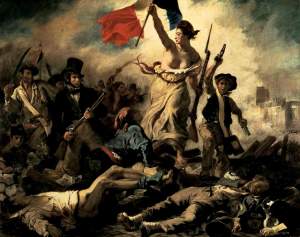
Liberty Leading the People, 1830, Eugène Delacroix. Borrowed here.
For the past couple of weeks, I’ve been working on the nitty-gritty-analysing part of my bachelor thesis. Not going too much into that (as I find it better to finish it first before sharing my findings) I do, however, want to touch upon a connected subject: the theme of women and their (our) role in history.
A female professor of mine once posed the question: why is it called history? Why not herstory? This question, I think, exemplifies very well the core of the issue. A one-sidedness.
I read an article in the morning newspaper last weekend on 2015 being the 100th year for women’s and lower class men’s right to vote in Denmark.
Another day, an article in a financial magazine found me; on the lacking equality in female leaders’ access to top-positions in financial institutions (due to restricting norms, preconceptions and structural limits.) Then, I found yet a third article which stated that the Zeitgeist is making it difficult for women to have a career. In line with the second article, the article portrayed the reason being due to the fact of structural limits. (E.g. women being “left” with the larger part, or the whole period, of maternity/paternity leave. Which means women are being pulled away from the job market and thus the opportunity to have a career.)
But I wonder: is there not a deeper and more firmly rooted structure – a structure of thinking, of consciousness – as the second article mentioned – that makes it difficult for us to be who we are? Regardless of sex, age, religion etcetera.
I can take myself as an example; my fear of criticism and fear of the loss of love. Where do these derive from? I think they are universal; but I also think that they can be more or less cultivated. And here I think it matters whether you are born as a woman or a man. And where.
Women have, as Virginia Woolf wrote in 1928, a very short story to look back upon – when searching for female geniuses and heroes.
Agreed, the 20th century did take some strides toward equality between the sexes – in some corners of the world.
Yet I still think we have to ask ourselves, no matter our sex, religion etcetera: have I been conditioned to think in a certain way? To look at the world in a particular way? Is there a one-sidedness to my thinking?